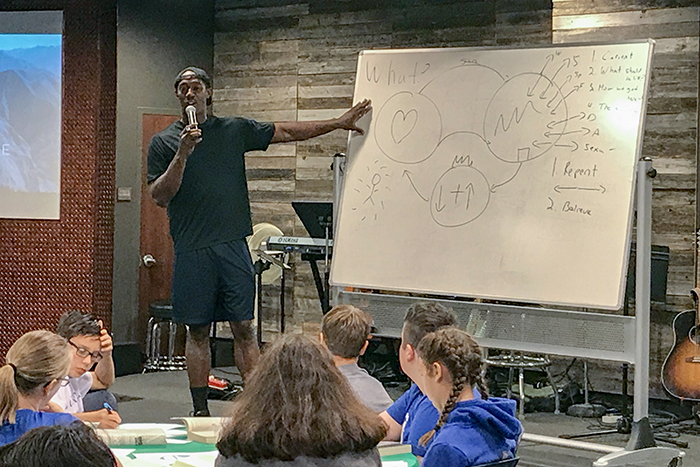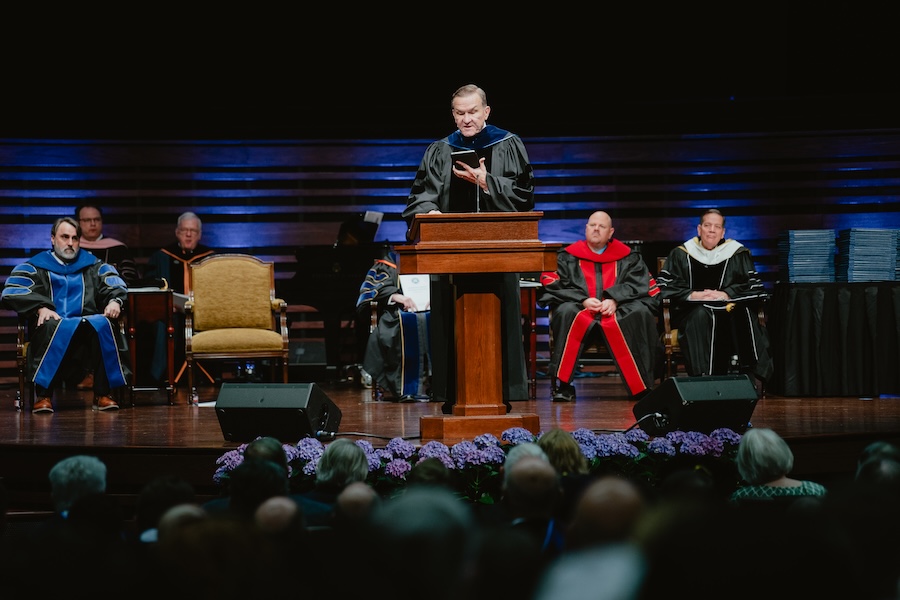Youth ministry trains students to live ‘life on purpose’

The youth ministry at North Richland Hills Baptist Church (NRHBC) in North Richland Hills, Texas, is training its students to live “life on purpose”—that is, to live for the purpose of sharing the Gospel and making disciples.
On Sept. 28, for the second year in a row, the youth ministry hosted a day-long evangelism training titled “Life on Purpose,” or LOP. Despite being an event, LOP’s aim was to cultivate within students a lifestyle of Gospel intentionality.
“We don’t want students or believers to see this as a program; as ‘Hey, we’re going to go do an event, check the box, [then] go do something else,’” says Dave Bryant, lead student minister at NRHBC and a 2016 Master of Divinity graduate of The Southwestern Baptist Theological Seminary.
“We’re trying to show them this was the purpose that God intended every believer to live—to live their life on mission, to advance the Gospel, realizing that our DNA as Christians is to go make disciple-makers, and to do that wherever God sends us.”
Forty students participated in LOP, comprising mostly new faces relative to the first year. Bryant notes that this means even more students in the youth group have been trained for evangelism.
Of the students who returned from the previous year, several took leadership positions in the training, applying what they learned in last year’s training and passing it along to a new crop of students.
The training covered God’s heart for missions, a consideration of family and friends whom students could influence, and a Gospel presentation method known as “the Three Circles,” which entails drawing three circles representing God’s perfect design; this sin-cursed, broken world; and the Good News of Jesus Christ. After this, students broke into teams of three or four and went to nearby parks and neighborhoods to ask people how they could pray for them and to share the Gospel.
Collectively, the teams knocked on 118 doors; handed out 97 water bottles at local parks; prayed for 56 people; and shared the Gospel with 21 individuals.
In one instance, a girl spoke with a Catholic priest about the role of works in one’s salvation, and in another, a team spoke with a woman who reflected a charismatic understanding of visions and healing.
“I was impressed to see that they didn’t get derailed by tangents, but they stuck on the Gospel—what was core,” Bryant says. “They didn’t argue about nonessentials, but they were making sure to present the essentials in a correct way.”
At a skate park, one student had the opportunity to witness to a peer whom he had identified in the training earlier that day as someone within his sphere of influence with whom he could share the Gospel. Another team met a man who had just moved to the area and was looking for a church to join. The team promptly invited him to NRHBC.
Jack Crow, a high school senior who led in the training and subsequently led a group of middle school students in door-to-door evangelism, says he was encouraged by his teammates’ willingness to share the Gospel with strangers. “That is always an amazing thing to see out of true followers of Christ—that passion to go out,” Crow says.
Though the teams did not see any salvations, Associate Minister to Students Daniel Simmons says the fact that students went out into the community constitutes a “win.”
“We had a lot of good conversations in the community; just to be able to be a mark in the community and say, ‘NRHBC cares enough to knock on your door and pray for you and ask you about where you are with the Lord,’” says Simmons, an M.Div. student at Southwestern Seminary. “I would consider that the biggest win from a student ministry perspective.”
Crow adds that he was comforted by the knowledge that seeds were planted that may later grow into salvation decisions. “What an amazing thing that people might be saved out of, ‘Hey, can I share this Three Circles breakdown—just a picture of the Gospel—real quick?’ This may seem like a silly cartoon to some people, but you never know: for some people, it may be the most revolutionary thing that they’ll ever hear in their lives.”
Simmons says such evangelistic practices are important not just for the potential decisions that result, but also because they are commanded by the Lord.
“We tend to default away from that,” he says, “and so I think it’s important that we take that initiative to live on purpose, with the intentionality of sharing the Gospel. And I think your spirit will be full after doing that.”



